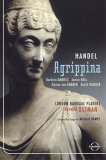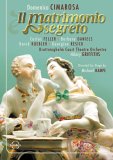![Rossini: Il Barbiere di Siviglia (The Barber of Seville) -- Stuttgart [1988]](/pictures/1028691.jpg) Rossini: Il Barbiere di Siviglia (The Barber of Seville) -- Stuttgart | DVD | (06/03/2001)
from £9.95
| Saving you £15.04 (151.16%)
| RRP
Rossini: Il Barbiere di Siviglia (The Barber of Seville) -- Stuttgart | DVD | (06/03/2001)
from £9.95
| Saving you £15.04 (151.16%)
| RRP The point of a good production of Rossini's Il Barbiere di Siviglia is to have a Rosina and a Figaro who will knock your socks off in their respective arias, while holding back enough in all those crescendo ensembles in which the farce plot reaches its several culminations that the other stars get a chance to shine too. Cecilia Bartoli and Gino Quilico give full-blooded enough performances when on stage by themselves that self-effacement seems far from imminent, yet both are capable of less, and give it when it is needed. Of the others, David Kuebler is an attractively raffish Almaviva, while Robert Lloyd turns Basilio into a memorable cameo. Gabriele Ferro is one of the most intelligent of Rossini conductors--he understands the relationship between the pulse of the music and its dramatic function, and he is also outstanding in the delicacy of phrasing, even in climaxes, that ensures that every voice, every instrument, gets the moment of glory Rossini intended. Michael Hampe's solid reliable unfussy production keeps everything moving without drawing attention to itself. The DVD has subtitles in English, French, German, Italian and Spanish, as well as trailers for other Arthaus Musik discs. --Roz Kaveney
![R. Strauss: Capriccio -- San Francisco Opera [1993]](/pictures/1028325.jpg) R. Strauss: Capriccio -- San Francisco Opera | DVD | (26/06/2003)
from £N/A
| Saving you £N/A (N/A%)
| RRP
R. Strauss: Capriccio -- San Francisco Opera | DVD | (26/06/2003)
from £N/A
| Saving you £N/A (N/A%)
| RRP The last and most subtle of Richard Strauss's operas, Capriccio gets a finely nuanced interpretation in this San Francisco Opera production. A generally excellent cast is highlighted not only by the radiant presence of Kiri Te Kanawa but by the deceptively robust performance of Tatiana Troyanos in her last operatic appearance before her untimely death from cancer. The composer described Capriccio as a "conversation piece for music in one act", and he put much effort into not only the music but the words, on which he collaborated with conductor Clemens Krauss. Krauss's verbal input was particularly appropriate in this work, because the real subject (symbolised by a conventional love triangle) is the competition (and alliance) between words and music in opera, a subject naturally close to the composer-librettist's heart. The conversation runs through the whole opera in various forms. It begins immediately after the curtain goes up, with a quarrel between the poet Olivier (Simon Keenlyside) and the composer Flamand (David Kuebler) over the respective merits of their arts. They are rivals for the hand of the widowed Countess Madeleine (Te Kanawa); she is to choose between them (i.e., between poetry and music) but she is still undecided as the final curtain descends. The intervening two hours are rich in artistic shop talk and backstage situations that will enchant sophisticated opera-lovers, as well as the love interest for the rest of us. David Runnicles conducts with a sure sense of Straussian style; and Mauro Pagano's 18th-century set creates the right atmosphere. Keenlyside and Kuebler are eloquent and believable, Te Kanawa sweet, regal and ambiguous. Hakan Hagegard and Victor Braun give particularly vivid performances in supporting roles. --Joe McLellan
![Strauss: Arabella [1995]](/pictures/1028679.jpg) Strauss: Arabella | DVD | (16/04/2001)
from £N/A
| Saving you £N/A (N/A%)
| RRP
Strauss: Arabella | DVD | (16/04/2001)
from £N/A
| Saving you £N/A (N/A%)
| RRP Like most of his later operas, Richard Strauss' Arabella ends with a meltingly lovely duet. But then criticising Strauss for composing melodically enduring operas is as pointless as lambasting Vermeer for painting only exquisite interior scenes. Those who say Strauss never improved on Rosenkavalier may be right but when such beguiling sounds kept coming from his music for the next 30 years of his life, there shouldn't be any quibbles. Arabella is, in a nutshell, the story of a woman who cannot make up her mind about a suitor. Taped at the Metropolitan Opera House in 1994 under the baton of conductor Christian Thielemann, this production features Kiri Te Kanawa in the title role; her acting is mediocre but vocally she never forces anything and at least sounds like the perfect Arabella. Wolfgang Brendel does well with Mandryka, who finally ends up with Arabella and Marie McLaughlin makes a sympathetic younger sister to the heroine as Zdenka. Otto Schenk's production is sturdily conservative, the video transfer is acceptable if unspectacular and the sound mix is CD-quality. --Kevin Filipski, Amazon.com
 Agrippina - Handel | DVD | (03/10/2005)
from £29.68
| Saving you £-4.69 (N/A%)
| RRP
Agrippina - Handel | DVD | (03/10/2005)
from £29.68
| Saving you £-4.69 (N/A%)
| RRP Agrippina: Handel
![La Scala Di Seta - Rossini [1990]](/pictures/1038705.jpg) La Scala Di Seta - Rossini | DVD | (03/03/2006)
from £14.55
| Saving you £10.44 (71.75%)
| RRP
La Scala Di Seta - Rossini | DVD | (03/03/2006)
from £14.55
| Saving you £10.44 (71.75%)
| RRP Gioacchino Rossini's La scala di setaA stage production of the Oper der Stadt Koln and the Opera de Montpellier from the Schwetzinger Festspiele.Recorded live at the Rokokotheater Schwetzingen 6-8 May 1990.
![Idomeneo - Mozart [1991]](/pictures/1046564.jpg) Idomeneo - Mozart | DVD | (02/05/2006)
from £N/A
| Saving you £N/A (N/A%)
| RRP
Idomeneo - Mozart | DVD | (02/05/2006)
from £N/A
| Saving you £N/A (N/A%)
| RRP This revised revival of the acclaimed 1986 Drottningholm production by Michael Hampe conducted by Arnold Ostman was staged during the Mozart Bicentenary year. Combining both tragedy and comedy with drama Idomeneo boasts a series of superbly expressive pieces which Einstein described as one of those works that even a genius of the highest rank like Mozart could write only once in his life.
 Il Matrimonio Segreto - Cimarosa | DVD | (31/10/2005)
from £N/A
| Saving you £N/A (N/A%)
| RRP
Il Matrimonio Segreto - Cimarosa | DVD | (31/10/2005)
from £N/A
| Saving you £N/A (N/A%)
| RRP 'Il Matrimonio Segreto' is Cimarosa's most famous opera which is reputed to have won immense admiration from Emperor Leopold II at its first performance in 1792. T Austrian Emperor liked this masterpiece so much that he ordered it to be played again from the beginning! Domenico Cimarosa's opera about the amorous bumblings of Bolognese gentry is performed by the Cologne Opera at the 1986 Schwetzingen Festival.
![La Cambiale Di Matrimonio - Rossini [1989]](/pictures/1039515.jpg) La Cambiale Di Matrimonio - Rossini | DVD | (31/03/2006)
from £25.66
| Saving you £0.59 (2.42%)
| RRP
La Cambiale Di Matrimonio - Rossini | DVD | (31/03/2006)
from £25.66
| Saving you £0.59 (2.42%)
| RRP This sparkling production continues the Rossini one-act opera series emerging from the Schwetzingen Festival with excellent direction acting and stagecraft.This production of La cambiale di matrimonio represented yet another piece de resistance that sets a standard in musical buffoonery for the other all too rare productions in this genre.Recorded live at the Rococo Theatre Schwetzingen May 1989.
![Janacek: Katia Kabanova --Salzburg Festival [1998]](/pictures/1028514.jpg) Janacek: Katia Kabanova --Salzburg Festival | DVD | (01/07/2002)
from £N/A
| Saving you £N/A (N/A%)
| RRP
Janacek: Katia Kabanova --Salzburg Festival | DVD | (01/07/2002)
from £N/A
| Saving you £N/A (N/A%)
| RRP With its overt love interest and focus on individual isolation, Katia Kabanova is the first of the four operas that crowned the productive last decade of Leos Janacek (1854-1928). The operatic idioms of Dvorak and Verdi are transmuted through his singular soundworld, whose vocal lines convey subtle speech inflexions and whose orchestral writing has a keen pathos and surging emotional intensity. Christoph Marthaler's production for the 1998 Salzburg Festival updates the provincial Russia of the 1850s to that of the 1990s, a decaying tenement block whose inhabitants live out a futile existence. It neither enhances nor undermines the music, in which Angela Denoke's wan Katia gradually gains in conviction, culminating in a touching "mad scene" and ill-fated reconciliation with her lover Boris. David Kuebler is powerful in this role, while Jane Henschel is characterful but lightweight as Kabanicha (mother-in-law) and Hubert Delamboye sympathetic as Katia's put-upon husband Tichon. Sylvain Cambreling, an experienced opera conductor, directs the Czech Philharmonic skilfully and with flair. On the DVD: Katia Kabanova arrives on disc with a 16:9 aspect ratio that captures the many oblique camera angles and perspective shifts; and sound in LPCM Stereo, Dolby 5.1 and DTS options. Subtitles are in five European languages, and there are 29 access points. There are no special features, apart from the regular TDK trailer, but the booklet has a useful, if generalised synopsis of the opera.--Richard Whitehouse

Please wait. Loading...
This site uses cookies.
More details in our privacy policy